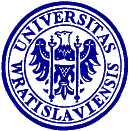Current schedule available here
Past schedule for Discrete Harmonic Analysis Seminar 2006/2007
Seminar of the Mathematical Analysis Group in Institute of Mathematics, University of Wroclaw.Current schedule available on www.math.uni.wroc.pl/analiza
Organizers: prof. Marek Bożejko (the main organizer), Piotr Śniady (technical organizer)
Time and place: usually every Wednesday, 10.15 - 12.00 in Institute of Mathematics, University of Wroclaw, room 607.
